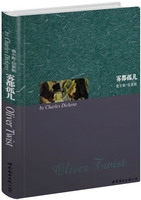溫馨貼士:
每日睡前床頭物語,讓您的生活質量更高。
經典語段:
And so Oliver was left with only the drunken nurse. Without clothes, under his first blanket, he could have been the child of a king or a beggar.
奧利弗就這樣被留下了,由那位醉醺醺的看護一個人看著。他光著身子,裹在畢生第一塊毯子里,既可以是國王的兒子,也可以是乞丐的兒子。
But when the woman dressed him later in rough cotton clothes, yellow with age, he looked exactly what he was - an orphan in a workhouse, ready for a life of misery, hunger, and neglect.
可后來老婦人給他穿上了由于年頭太久而發了黃的粗棉布衣服,這時,他看上去和他的身份完全一致了——一個濟貧院的孤兒,準備好了去過一種充滿苦難、饑餓和忽視的生活。
Oliver cried loudly. If he could have known that he was a workhouse orphan, perhaps he would have cried even more loudly.
奧利弗大聲哭著。假如他已經知道自己是一個濟貧院的孤兒,他可能會哭得更響些。
語段精講:
第一、詞匯精講
1. leave
雙語釋義:to leave your wife, husband or partner permanently
[vt.] 遺棄,丟棄
搭配模式:~ sb (for sb)
典型范例:She's leaving him for another man.她要拋棄他而去跟另外一個男人。
2. drunken
雙語釋義:drunk
[adj.] 醉的
典型范例:The police are tightening up on drunken driving.
警方目前采取嚴厲手段對付醉酒駕車行為。
The drunken man was a dead weight in my arms.
這個醉漢在我懷里死沉。
3. rough
雙語釋義:not level or smooth
[adj.] 粗糙的
典型范例:Those are rough woollen cloth wich might be of help to us.
那是些粗糙的毛料布,或許對我們還有用。
4. orphan
雙語釋義:person (esp a child) whose parents are dead
父母雙亡的人;(尤指)孤兒
典型范例:He has been an orphan since he was five.
他五歲時即淪為孤兒。
I have been taking care of an orphan nephew.
我一直在照顧著一個雙親亡故的侄兒。
第二、固定短語
1. dress in
講解:這是動詞短語,通常在動詞dress后面接somebody,介詞in后面接something,意思是(給某人)穿上(衣服)。
范例1: I'm going to dress the baby in new clothes and take her to the park.
我要給小孩子穿上新衣服, 帶她到公園去。
范例2:We must be dressed in uniform at school.
在學校我們必須穿制服。
2. ready for
講解:這是形容詞短語,介詞for后面可接名詞或名詞性從句,短語等。
范例1:I want the report ready for the three o'clock deadline.
我希望報告最遲在三點之前準備好。
范例2: You had to be ready for any emergency.
你得隨時預防不測。
3. with age
講解:這是介詞短語,with是“隨著”的意思,with age可以表示“隨著年齡的增長”,也可以表示“因年久”。文中說到的是yellow with age可以翻譯為:因年久而發黃的,隨著年月的流逝而發黃的。
范例1:The old house has grown shabby with age.
那座老房子因年代久遠而變得破舊。
范例2:Her wrinkles deepen with age.
她的皺紋隨年齡增長而變深。
范例3:A man grows wiser with age.
隨著年令的增長,人變得更聰明。
范例4:The leaves of the book were yellowed with age.
書頁因年久而變黃。
第四、寫作語匯
1. rough cotton clothes:粗糙的棉麻布
2. a life of misery, hunger, and neglect:充滿痛苦、饑餓和輕視的生活
第三、語法講解
1. And so Oliver was left with only the drunken nurse.
要點解析:with only the drunken nurse是介詞短語作伴隨狀況狀語。
2. Without clothes, under his first blanket, he could have been the child of a king or a beggar.
要點解析1:with clothes是伴隨狀況狀語,under his first blanket是介詞短語作地點狀語,如果這個兩種不同功能的介詞短語同在一個句子中,伴隨狀況狀語位于地點狀語前面。
要點解析2:這句話使用了虛擬語氣,謂語結構是could have been,在這里的用法表示主觀猜測,即對已經發生動作或已經存在的狀態作出主觀上的猜測,通常可譯為“可能已經…”,有時需根據具體語境來翻譯。如:
Tom could have taken the money; he was here alone yesterday. (有可能是湯姆把錢拿走了,昨天他單獨一個人在這里呆過。)
3. But when the woman dressed him later in rough cotton clothes, yellow with age, he looked exactly what he was - an orphan in a workhouse, ready for a life of misery, hunger, and neglect.
要點解析1:yellow with age是形容詞后面又跟有短語的要放于別修飾詞的后面,做后置定語修飾clothes。
要點解析2:ready for a life of misery, hunger, and negelect是形容詞短語作后置定語,修飾名詞orphan。
4. If he could have known that he was a workhouse orphan, perhaps he would have cried even more loudly.
要點解析:這是非真實條件虛擬句,主句和從句都是用了虛擬語氣,主句的是would have cried,從句的是could have cried。這2個結構都表示與現實相反的目前情況。
Could have known that he was workhouse orphan的意思是“能知道他是救濟院的孤兒”,可是實際上Oliver在那時候不能知道,would have cried even more loudly意思是“將會哭得更加大聲”,而實際上他并非如此。
第四、語句賞析
1. Oliver cried loudly.
賞析:這句話是雙關語。Cry loudly既指人本能的大聲的哭叫,又指對不公世道的大聲憤慨。
2. Without clothes, under his first blanket, he could have been the child of a king or a beggar.
賞析:這句話道出人生來來就是平等的,可以做皇帝統治的權利,也可以又淪為可悲的乞丐的可能性。這就是社會地位的差別,而著社會地位的差別是諸多因素如何而造成的,例如:家庭背景。











